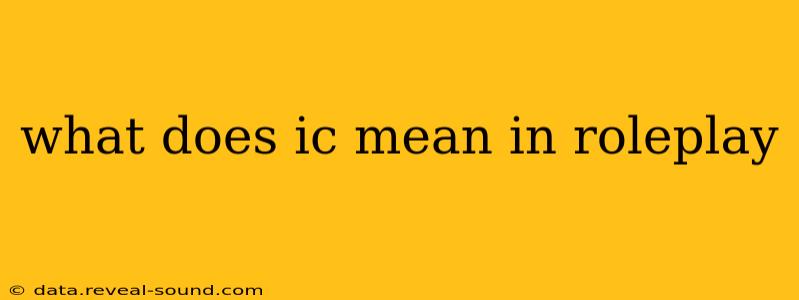In the world of roleplaying, whether online or offline, understanding the abbreviations and jargon is key to seamless participation. One common abbreviation you'll encounter is "IC." But what does IC mean in roleplay? Simply put, IC stands for "in character."
This term indicates that a player is speaking or acting as their roleplaying character, rather than themselves as a person outside the roleplay (OOC, or "out of character"). Understanding this distinction is crucial for navigating the narrative and avoiding confusion.
Why is the IC/OOC Distinction Important?
The difference between IC and OOC actions and statements is fundamental to successful roleplaying. It helps maintain the integrity of the shared fictional world and prevents real-world conflicts from bleeding into the narrative.
Here's why the IC/OOC distinction is so important:
-
Maintaining Narrative Consistency: IC actions directly impact the story's progression. OOC comments, however, are meta-narrative – they are about the roleplay itself, not within it. Confusing the two can lead to plot holes or inconsistencies.
-
Preventing Confusion: Clearly labeling actions as IC or OOC prevents misunderstandings among players. Knowing whether a statement is a character's action or a player's comment avoids misinterpretations and keeps the roleplay flowing smoothly.
-
Respecting Boundaries: Some roleplay settings might have sensitive themes. The IC/OOC distinction provides a safeguard to ensure that personal boundaries are respected and that the fictional world remains separate from reality.
-
Enhancing Immersion: The clear delineation between IC and OOC elements helps players to maintain immersion in the roleplay. By sticking to the "rules" of the fictional world (within the confines of the IC space), the overall experience becomes richer and more engaging.
Common Scenarios Using IC and OOC
Let's look at some common scenarios where understanding the IC/OOC distinction is vital:
-
Character Interaction: "IC: My character approaches the mysterious figure and asks, 'Who are you?'" This demonstrates an action within the roleplay context.
-
Meta-Discussion: "OOC: Should we add more details to the backstory of the villain?" This is a comment about the roleplay itself, not something happening within the story.
-
Addressing Problems: "OOC: I'm going to be unavailable for the next hour, so please hold off on crucial scenes until I return." This addresses a real-world issue impacting the roleplay.
-
Clarification: "OOC: Just to clarify, is my character supposed to be aware of the prophecy?" This is a request for information about the roleplay's mechanics or narrative.
What if I'm unsure?
If you ever find yourself unsure whether something should be IC or OOC, err on the side of caution and label it explicitly. It's always better to be clear than to risk disrupting the flow of the roleplay or causing confusion among your fellow players. Most roleplaying communities have established conventions for signaling IC and OOC interactions, so familiarize yourself with the specific guidelines of the group you're participating in. Open communication and asking questions are key to ensuring everyone understands the parameters of the shared fictional space.
